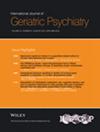Clozapine Treatment in Patients With a Neurocognitive Disorder
Abstract
Objectives
Behavioural and Psychological Symptoms of Dementia (BPSD) are usually managed with a combination of pharmacological and nonpharmacological interventions, but efficacy is often moderate, and many patients are treatment-resistant. We aimed to evaluate the indication for treatment with clozapine, response, side effects, frequency of clozapine discontinuation, reasons for discontinuation and time to discontinue clozapine in patients with a neurocognitive disorder.
Methods
A retrospective cohort study including all patients with a neurocognitive disorder who started with clozapine between 2011 and 2020, admitted to old age departments of a psychiatric hospital in The Netherlands. The Clinical Global Impression of Improvement-scale (CGI-I) was used to evaluate treatment response, based on clinical notes in the electronical patients' files. Side effects and variables concerning discontinuation of clozapine treatment were also extracted from patients' files.
Results
We included 81 inpatients who started with clozapine and had a major neurocognitive disorder. A clinically relevant positive treatment response (CGI-I score 1-2) was found in 27 patients. Patients without a delirium have a statistically significantly better outcome compared to patients with a delirium superposed on a neurocognitive disorder (Chi2 = 14.47, df = 2, p < 0.0001). Only 79 side effects were reported in these 81 patients, and severe side effects in only 2 patients. Side effects were the primary reason to discontinue clozapine in 11 patients, lack of efficacy in 7 patients and side effects combined with lack of efficacy in 5 patients. The median clozapine dose was only 50 mg/day, and a higher dose was a significant predictor of a shorter treatment duration.
Conclusion
Clozapine may be an effective and safe intervention for patients with a neurocognitive disorder and BPSD without a superposed delirium. Clozapine at a low dose may be a treatment option for severe, treatment resistant BPSD.

 求助内容:
求助内容: 应助结果提醒方式:
应助结果提醒方式:


